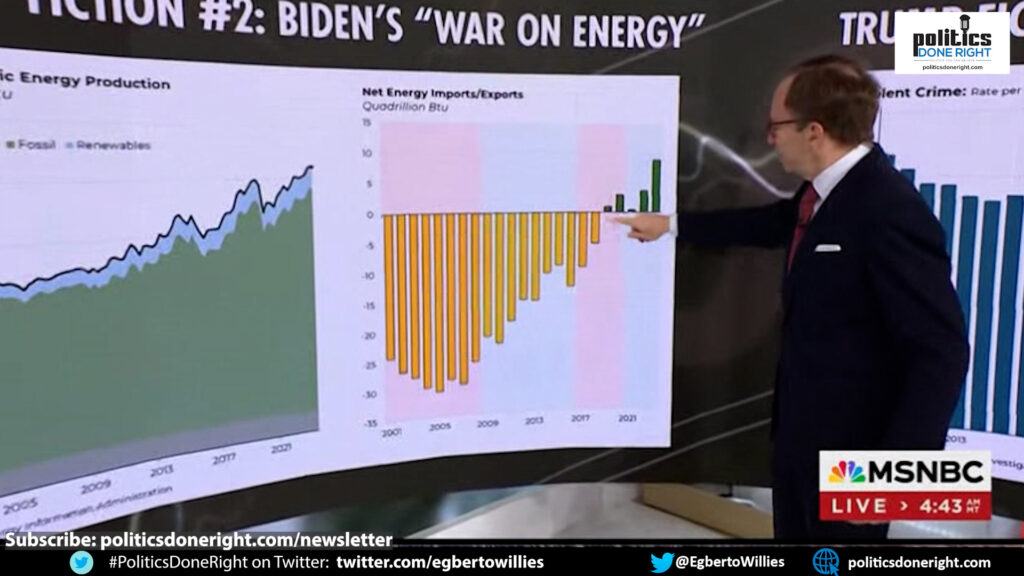Mika Brzezinski played segments of Donald Trump’s speech with lies on the deficit, energy, and crime. Steven Rattner debunked them all with the charts.
Steven Rattner debunks Trump’s lies.
Podcasts (Video — Audio)
The political discourse has increasingly veered toward polarization and misinformation, and fact-checking has become paramount in safeguarding the integrity of democratic processes and ensuring an informed electorate. The confrontation between the narratives of former President Donald Trump and the actual data, as presented by Steven Rattner, offers a compelling case study in this ongoing struggle. Rattner, a former treasury official and economic analyst, recently took to the airwaves to methodically debunk Trump’s claims on energy, deficits, and crime, juxtaposing these assertions against actual data and thus painting a vivid picture of the reality under President Joe Biden’s administration.
Trump’s tenure and subsequent campaigning have been marked by a distinctive narrative strategy that often relies on dramatizing issues like crime, energy independence, and fiscal responsibility. He posits an America under siege by crime “like never ever before,” crippled by misdirected energy policies, and recklessly indifferent to the ballooning deficits and national debt. However, as Rattner meticulously illustrates through data, these portrayals diverge significantly from the factual realities.
Addressing the claim of rampant crime, Rattner presents data showing a notable decrease in violent crime rates since 2020, with figures dropping by 15%, starkly contradicting Trump’s narrative of unparalleled criminal activity. This decline in crime rates under Biden’s watch suggests a complexity to the issue that Trump’s broad strokes fail to capture, underscoring the importance of nuanced analysis over sensational rhetoric.
On the energy front, Trump’s accusations of Biden’s “Nation wrecking war on American Energy” fall flat when confronted with the reality of record energy production during Biden’s term. Rattner points out that not only has energy production reached an all-time high, encompassing nuclear, fossil fuels, and renewables, but the United States has also achieved energy independence—a status it has maintained for the last five years. This contradicts Trump’s narrative and highlights a continuation, if not enhancement, of America’s energy capabilities.
Furthermore, the discussion of fiscal responsibility reveals a stark contrast between Trump’s claims and the fiscal outcomes of his policies. Despite Trump’s assertion of tax cuts and a path to reducing the national debt, the data shows a significant increase in the deficit during his tenure, exacerbated by tax cuts that did little to curb spending. In contrast, under Biden, there has been a concerted effort to reduce the deficit, challenging the narrative of fiscal recklessness attributed to his administration.
Rattner’s fact-checking goes beyond merely correcting inaccuracies; it serves as a clarion call for the necessity of holding political figures to account for the veracity of their statements. The spread of misinformation poses a significant threat to the fabric of democracy, as it erodes trust in institutions and undermines the informed citizenry essential for democratic participation.
In light of Rattner’s revelations, it becomes clear that the battle against misinformation is not just about correcting false claims but also about illustrating the implications of these falsehoods for the public. It is a reminder that when divorced from factual accuracy, political narratives can distort public perception and policy discourse. The persistent effort to confront these narratives with data and evidence is crucial in promoting a more informed and rational political dialogue.
This case exemplifies the broader challenges facing American democracy, where misinformation and hyperbole increasingly cloud the public sphere. Rattner’s work underscores the importance of data-driven analysis in cutting through the noise, offering a beacon of clarity in a landscape fraught with misinformation. As the nation moves forward, the role of fact-checkers and data analysts in upholding the truth will remain an essential bulwark against the erosion of democratic principles.
Viewers are encouraged to subscribe and join the conversation for more insightful commentary and to support progressive messages. Together, we can populate the internet with progressive messages that represent the true aspirations of most Americans.

